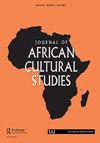Binyavanga Wainaina对国际货币基金组织一代作为发展批判的叙述
IF 0.9
2区 社会学
Q2 CULTURAL STUDIES
引用次数: 2
摘要
本文将宾亚万加·维奈纳的自传体和散文式写作作为一个发展理论和批评的场所来考察。重点是他的回忆录《总有一天我会写下这个地方》(格兰塔出版社,2011年)。在书中,Wainaina以生活写作为题材,讲述了他所谓的“imf一代”的故事。imf一代指的是非洲独立后中产阶级的孩子们,他们在上世纪八九十年代由于外国强加的结构调整而承受了巨大的压力,并在2000年后成为民主化运动的推动力。本文详细阐述了Wainaina是如何在他的作品中反映非洲新自由主义全球化的经验,以及西方人道主义的相关扩张。首先,通过关注Wainaina对国际货币基金组织一代的叙述中嵌入的发展的参与,其次,通过他对非洲人道主义话语的解构,这些话语以全球北方的殖民意识形态为基础,体现在肯尼亚援助行业的代表身上。我把这本回忆录作为一种情境知识的形式来阅读,它使来自世界不同地区的读者能够理解他们在特定历史时刻全球发展的权力不对称中的定位。本文章由计算机程序翻译,如有差异,请以英文原文为准。
Binyavanga Wainaina’s Narrative of the IMF-generation as Development Critique
ABSTRACT This article looks at Binyavanga Wainaina’s autobiographical and essayistic writing as a site of development theory and criticism. The focus is on his memoir One Day I Will Write About This Place (Granta, 2011). In it, Wainaina used life-writing as a genre to tell what he called the “story of the IMF-generation”, meaning the children of a post-independence African middle class who came massively under pressure due to foreign-imposed structural adjustment in the 1980s and 1990s, and who became a driving force in democratisation movements after 2000. This article elaborates on how Wainaina reflected this African experience of neoliberal globalisation and the related expansion of Western humanitarianism in his writing. This is explored through, firstly, a focus on Wainaina’s engagement with development embedded in his narrative of the IMF-generation, and secondly, through his deconstruction of a humanitarian discourse on Africa anchored in colonising ideologies of the global North and embodied in representatives of the aid industry in Kenya. I read the memoir as a form of situated knowledge that enables readers from different regions of the world to understand their locatedness within power asymmetries in global development at a particular historical moment.
求助全文
通过发布文献求助,成功后即可免费获取论文全文。
去求助
来源期刊

Journal of African Cultural Studies
Multiple-
CiteScore
1.70
自引率
10.00%
发文量
13
期刊介绍:
The Journal of African Cultural Studies publishes leading scholarship on African culture from inside and outside Africa, with a special commitment to Africa-based authors and to African languages. Our editorial policy encourages an interdisciplinary approach, involving humanities, including environmental humanities. The journal focuses on dimensions of African culture, performance arts, visual arts, music, cinema, the role of the media, the relationship between culture and power, as well as issues within such fields as popular culture in Africa, sociolinguistic topics of cultural interest, and culture and gender. We welcome in particular articles that show evidence of understanding life on the ground, and that demonstrate local knowledge and linguistic competence. We do not publish articles that offer mostly textual analyses of cultural products like novels and films, nor articles that are mostly historical or those based primarily on secondary (such as digital and library) sources. The journal has evolved from the journal African Languages and Cultures, founded in 1988 in the Department of the Languages and Cultures of Africa at the School of Oriental and African Studies, London. From 2019, it is published in association with the International African Institute, London. Journal of African Cultural Studies publishes original research articles. The journal also publishes an occasional Contemporary Conversations section, in which authors respond to current issues. The section has included reviews, interviews and invited response or position papers. We welcome proposals for future Contemporary Conversations themes.
 求助内容:
求助内容: 应助结果提醒方式:
应助结果提醒方式:


